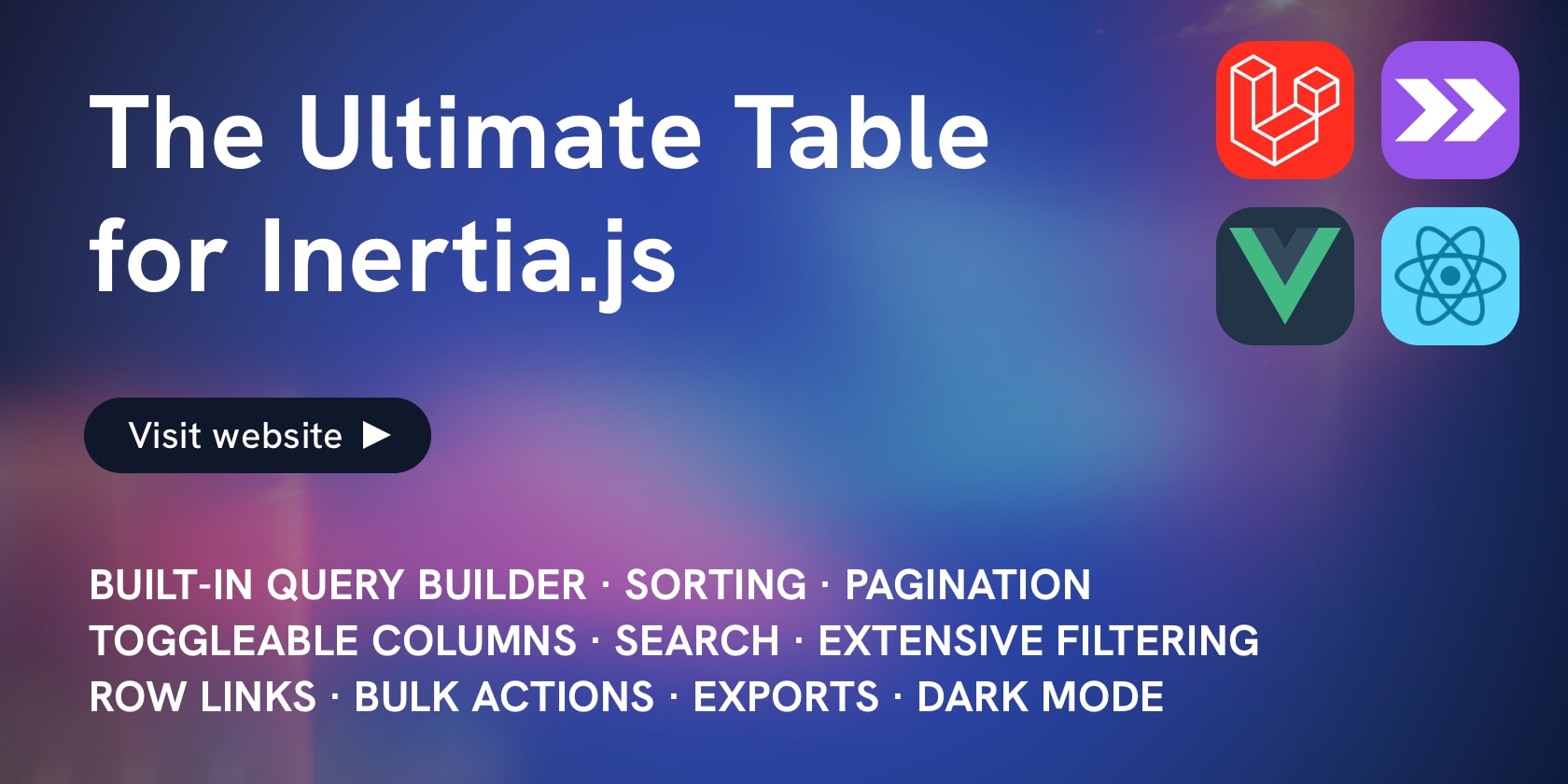Laravel package to compile Blade templates in memory. Requires PHP 8.2 or higher, compatible with Laravel 10+.
❤️ We proudly support the community by developing Laravel packages and giving them away for free. If this package saves you time or if you're relying on it professionally, please consider sponsoring the maintenance and development and check out our latest premium package: Inertia Table. Keeping track of issues and pull requests takes time, but we're happy to help!
You can install the package via composer:
composer require protonemedia/laravel-blade-on-demandYou can render any valid Blade Template by calling the render method on the BladeOnDemand facade. The method only takes two parameters, the template content and the data you want to pass to the template.
$output = BladeOnDemand::render('Hello {{ $name }}', ['name' => 'Protone Media']);
echo $output;
// "Hello Protone Media"This is a just an example but you can use statements, components and other Blade features as well.
This feature prevents your render from failing whenever a variable is missing in your data array. By default it will fill the missing variable with the name of the variable itself. In this case $name is missing so the data array becomes ['name' => 'name'];
$output = BladeOnDemand::fillMissingVariables()->render('Hello {{ $name }}', []);
echo $output;
// "Hello name"You could also use this feature to preview a template without any data. Note that this might give unexpected results when using statements. You can also pass a callable to the fillMissingVariables method to customize the handling of missing variables:
$output = BladeOnDemand::fillMissingVariables(
fn ($variable) => "_MISSING_{$variable}_MISSING_"
)->render('Hello {{ $name }}');
echo $output;
// "Hello _MISSING_name_MISSING_"This feature can be used to render a mail as if you're using a Markdown mailable.
$contents = implode(PHP_EOL, [
'@component("mail::message")',
'# Hello {{ $name }}',
'@endcomponent',
]);
$output = BladeOnDemand::renderMarkdownMailToHtml($contents, ['name' => 'Protone Media']);
echo $output;
// <!DOCTYPE>
// <html xmlns="http://www.w3.org/1999/xhtml">
// <head>
// ...
// </head>
// <body>
// <style>
// ...
// </style>
// <table>
// ...
// <h1>Hello Protone Media</h1>
// ...
// </table>
// </body>
// </html>You can optionally specify a theme, just like calling the theme method on a Mailable.
BladeOnDemand::theme('invoice')->renderMarkdownMailToHtml($contents, $data);Similair feature as the above renderMarkdownMailToHtml method except it uses components from the text directory. You can read more about this feature in the Laravel documentation.
$contents = implode(PHP_EOL, [
'@component("mail::message")',
'# Hello {{ $name }}',
'@endcomponent',
]);
$output = BladeOnDemand::renderMarkdownMailToText($contents, ['name' => 'Protone Media']);
echo $output;
// [AppName](http://localhost)
//
// # Hello Protone Media
//
// © 2020 AppName. All rights reserved.The parseMarkdownMail method is the same as the renderMarkdownMailToText method but it also parses the Markdown.
$contents = implode(PHP_EOL, [
'@component("mail::message")',
'# Hello {{ $name }}',
'@endcomponent',
]);
$output = BladeOnDemand::parseMarkdownMail($contents, ['name' => 'Protone Media']);
echo $output;
// <p><a href="http://localhost">AppName</a></p>
// <h1>Hello Protone Media</h1>
// <p>© 2020 AppName. All rights reserved.</p>composer testPlease see CHANGELOG for more information what has changed recently.
Please see CONTRIBUTING for details.
Inertia Table: The Ultimate Table for Inertia.js with built-in Query Builder.Laravel Cross Eloquent Search: Laravel package to search through multiple Eloquent models.Laravel Eloquent Scope as Select: Stop duplicating your Eloquent query scopes and constraints in PHP. This package lets you re-use your query scopes and constraints by adding them as a subquery.Laravel FFMpeg: This package provides an integration with FFmpeg for Laravel. The storage of the files is handled by Laravel's Filesystem.Laravel MinIO Testing Tools: Run your tests against a MinIO S3 server.Laravel Mixins: A collection of Laravel goodies.Laravel Paddle: Paddle.com API integration for Laravel with support for webhooks/events.Laravel Task Runner: Write Shell scripts like Blade Components and run them locally or on a remote server.Laravel Verify New Email: This package adds support for verifying new email addresses: when a user updates its email address, it won't replace the old one until the new one is verified.Laravel XSS Protection: Laravel Middleware to protect your app against Cross-site scripting (XSS). It sanitizes request input, and it can sanatize Blade echo statements.
If you discover any security related issues, please email [email protected] instead of using the issue tracker.
The MIT License (MIT). Please see License File for more information.



